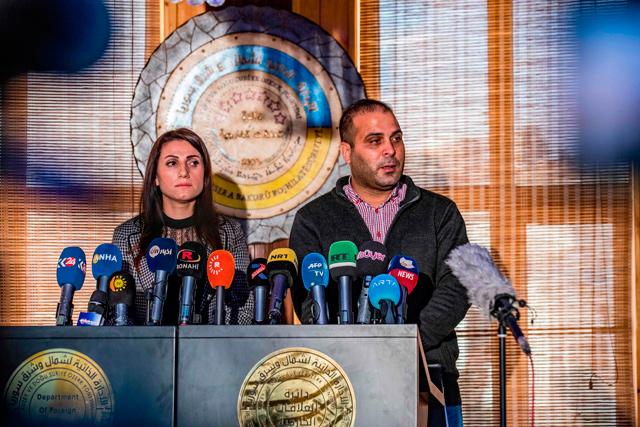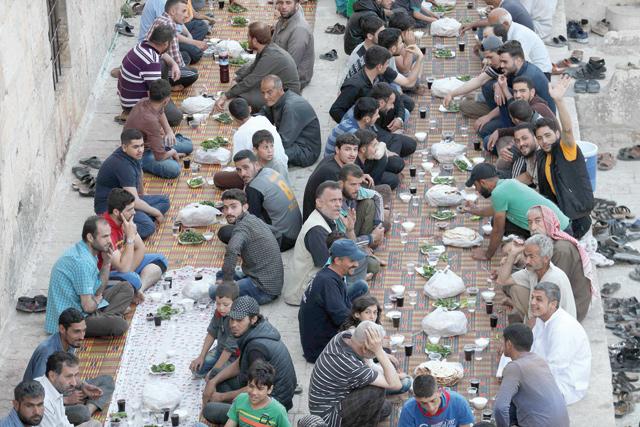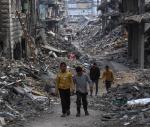You are here
Displaced huddle in a basement as winter grips Syria
By AFP - Dec 16,2018 - Last updated at Dec 16,2018
AL BAB, Syria — After washing up her family's dishes over a plastic basin, 11-year-old Cedra sits on the floor of the dank basement in Syria to tackle her day's studies.
A dark staircase leads from a street in the town of Al Bab to the gloomy space the young girl, her blind father and some 40 other families have the misfortune of calling home.
"There's a single room which we use as a kitchen, a bathroom and a bedroom," said Cedra.
She scribbled in her notepad, while crouched against a wall of bare cinder blocks and under a line of laundry trying to dry in the humid cellar.
The residents of this underground camp were displaced by the Syrian war, sometimes several times, mostly from the eastern province of Deir Ezzor.
Cedra's family fled the city of Deir Ezzor in 2012, in the early stages of Syria's conflict.
They took refuge in Raqqa, further west, but the city soon became the Syrian capital of the Daesh group's self-proclaimed "caliphate".
The subsequent bombardment of Raqqa, which was almost completely levelled, killed her mother and brother.
The girl and her father fled once more and eventually found their way to Al Bab, a rebel-controlled area near the border with Turkey.
'No money'
Cedra does not go to school because she needs to help her blind father, but one of the other adults living in the basement has organised classes for her and a few other children.
The war has set her back years in her education.
"I'm learning how to write the letters, it's only been a few days," said the girl, wearing a thick, red sweatshirt and a black headscarf.
Each morning, Cedra makes the bed, tidies the room, makes tea and prepares breakfast before studying.
Then it's time to prepare lunch, after which she plays with the other children before getting to work on dinner.
Blankets are piled up near a flimsy foam mattress in one corner of the small room. A handful of cooking utensils and a plastic broom are tucked away nearby.
"Life in this basement is not easy," said her father, Mohammed Ali Al Hassan, who hopes to return to Deir Ezzor.
"There is nothing to do here and no money," said the greying father, who used to sustain his family by selling fruit and vegetables from a street cart.
A resident of Al Bab made his basement available to the displaced in mid-2017. The space is now divided in 42 tiny "studios", one for each family.
Their food and other basic needs are provided for by local charities.
'Disastrous situation'
"The initial idea was to have a temporary shelter for people while they look for a housing solution," said Abu Abdel Rahman, who was also displaced from Deir Ezzor and acts as a kind of supervisor.
The place soon filled up and few of the families ever moved out for lack of affordable options.
"The smallest possible accommodation involves a rent of $100. Those you see here are those who can't pay that amount.”
"Here, everyone is experiencing a disastrous situation," said the 59-year-old, who used to work in a textile factory.
Kneeling in front of a white board, a woolly hat pulled tightly down on his head, Abu Omar forms the letters of the Arabic alphabet, which his pupils recite in unison.
He lost a hand and the bones in his left leg were smashed to pieces after an air strike hit his home in Deir Ezzor.
Abu Omar's disabilities left him unable to work but he teaches 13 of the basement's children.
He said that number has dropped steadily.
"Many of them just have to go out and work. Because of their social condition, many families have to interrupt their children's education," he explained.
Related Articles
QAMISHLI, Syria — Syria's Kurds have released 30 Syrians suspected of affiliation to the Daesh group after guarantees from tribal
BEIRUT — Russian fighters were among dozens of pro-government forces killed in eastern Syria this week in a deadly wave of attacks
BEIRUT — The Daesh terror group may have lost its "caliphate", but three months later, experts have warned the extremists are still attackin


















